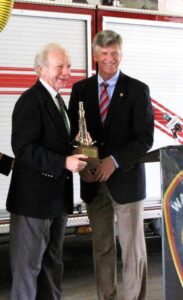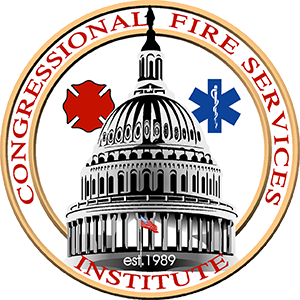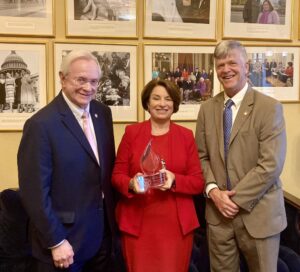Without Reauthorization, Vital Fire Service Grant Programs Will Cease to Exist
Washington, D.C. – Today, 39 national fire and emergency services organizations stand united in support of the reauthorization of the Assistance to Firefighters Grant Program (AFG), the Staffing for Adequate Fire and Emergency Response Grant Program (SAFER) and the United States Fire Administration (USFA). Without reauthorization, AFG and SAFER will sunset in less than one year, on September 30, 2024.
The AFG and SAFER grant programs are imperative to addressing the needs of more than one million fire and emergency services personnel. Fire departments respond to more than 36 million calls for service each year. These calls span all hazards from structural fire and wildfire to lithium-ion battery and hazardous materials response, opioid overdoses and other medical emergencies, water rescue, active shooter and hostile events, terrorism, natural disasters, and much more. Even while they protect their communities from an ever-increasing range of hazards, fire departments across the country are struggling to properly train and equip fire and EMS personnel, as well as ensure that departments have proper staffing to meet minimum requirements for response.
According to the National Fire Protection Association’s (NFPA’s) 5th Needs Assessment, “Fire service needs are extensive across the board.” Specifically, the report finds that “unmet needs for PPE [personal protective equipment] can be found in departments serving communities of all sizes, including one-third of the large departments…Among the smallest departments, 75 percent have at least some PPC [personal protective clothing] that is 10 years of age or older.” Ten years is the maximum lifespan recommended for PPE. Furthermore, “[more] than half (53 percent) of all fire departments cannot equip everyone with SCBA,” the breathing apparatus used by firefighters to do their jobs safely. The data shows that AFG and SAFER “must grow in order to address the considerable and multifaceted needs that continue to persist in the fire service.” The AFG and SAFER grant programs provide lifelines to fire and EMS departments across the nation that are caught in this battle of increasing costs and an acceleration of new missions.
USFA also plays a vital role at the national level as the primary representative of the fire and emergency services in the federal government. USFA ensures that the fire service is prepared to respond to all hazards and is the lead federal agency for fire data collection, public fire education, fire research, and fire service training. Every year, USFA provides training and education to both the fire service and the general public across the country. Through the National Fire Incident Reporting System (NFIRS), USFA also provides critical data on the state of fire and the fire service in America. USFA is a critical component in ensuring that the fire and emergency services are ready to respond to all hazards and must be reauthorized.
“When 9-1-1 is called, every community across the country relies on their fire and EMS personnel to respond regardless of the incident type,” said Bill Webb, Executive Director of the Congressional Fire Services Institute. “39 national fire service organizations stand to call on Congress to reauthorize the AFG and SAFER grant programs and the United States Fire Administration.”
“Data from NFPA demonstrates how underprepared our nation’s firefighters are – and how important the federal grant programs are,” said Seth Statler, Director of Government Affairs for the National Fire Protection Association. “Our most recent Needs Assessment of the U.S. Fire Service found that significant needs exist for departments of all sizes and in every area, including staffing, training and certification, facilities, apparatus, personal protective equipment or PPE; and health and wellness.”
“The AFG and SAFER grant programs are lifelines for fire departments across the country. They provide crucial funding to cover operational costs, allowing us to maintain our readiness and effectiveness in serving our communities…They help us secure equipment, vehicles, and training resources that are essential for our daily operations. They provide funds to hire and retain firefighters, ensuring that we have adequate personnel to respond to emergencies promptly. Without this funding, we would struggle to maintain the level of service our communities rely on. We need to preserve these programs in the future.” said Chief John Butler, President of the International Association of Fire Chiefs.
“AFG and SAFER grants are essential to the survival of many volunteer departments throughout the country. Without these grants many volunteer departments would cease to exist,” said Chief Kevin Quinn of the National Volunteer Fire Council. “These departments often fundraise with boot drives and pancake breakfasts, but even those efforts combined with local tax dollars can’t provide the needed funding.”
“Fire fighters serve in a uniquely dangerous job. We routinely respond to inherently dangerous calls where lives are at risk. When seconds count, the public deserves to know that trained and prepared fire fighters are standing ready,” said Dave Hoagland, President of the Washington DC Firefighters Association, Local 36 of the International Association of Fire Fighters. “The AFG and SAFER programs will close next year unless Congress acts. IAFF members in DC and across the nation are proud to answer our neighbors’ calls. But if we’re not there to answer the call – there is no alternative to 911. Congress’ inability to reauthorize these programs directly jeopardizes the lives of fire fighters and the public as a whole. It’s time for Congress to pass the Fire Grants and Safety Act.”
“This past May, 144 firefighters who died in the line of duty were honored at the National Fallen Firefighters Memorial in Emmitsburg, MD – 79 firefighters who died in 2022 and 65 who died in previous years. As of September 30th, the National Fallen Firefighters Foundation is aware of 100 reported firefighter fatalities this year,” said Victor Stagnaro, the CEO of the National Fallen Firefighters Foundation. “Our nation’s firefighters put their lives on the line every day to protect our communities. The AFG and SAFER grant programs are vital to ensuring our nation’s fire departments have the staffing, equipment, and resources they need to protect our communities and keep our firefighters safe.”
###
The Assistance to Firefighters Grant Program provides funds to help fire departments purchase much-needed gear and equipment and train personnel. Through the Fire Prevention and Safety (FP&S) grants, the AFG program also helps to fund community risk reduction efforts and vital fire service research.
The Staffing for Adequate Fire and Emergency Response Grant Program provides funds to help departments recruit and retain personnel to ensure that they can meet minimum staffing requirements needed for emergency response.
The mission of the U.S. Fire Administration is to support and strengthen fire and emergency medical services (EMS) and stakeholders to prepare for, prevent, mitigate and respond to all hazards.
For more information on AFG, SAFER, and USFA reauthorization efforts, see cfsi.org/support-afg-safer-and-usfa-take-action-now/.


 The Congressional Fire Services Institute (CFSI) recently presented U.S. Senator Amy Klobuchar (MN) with its 2022 Legislator of the Year award.
The Congressional Fire Services Institute (CFSI) recently presented U.S. Senator Amy Klobuchar (MN) with its 2022 Legislator of the Year award.